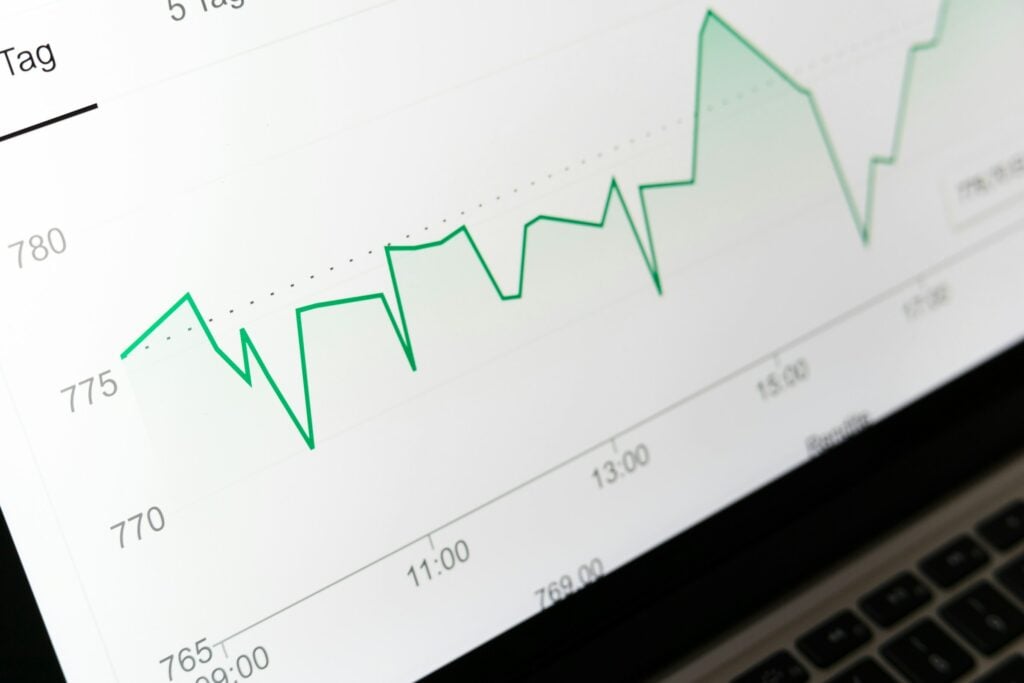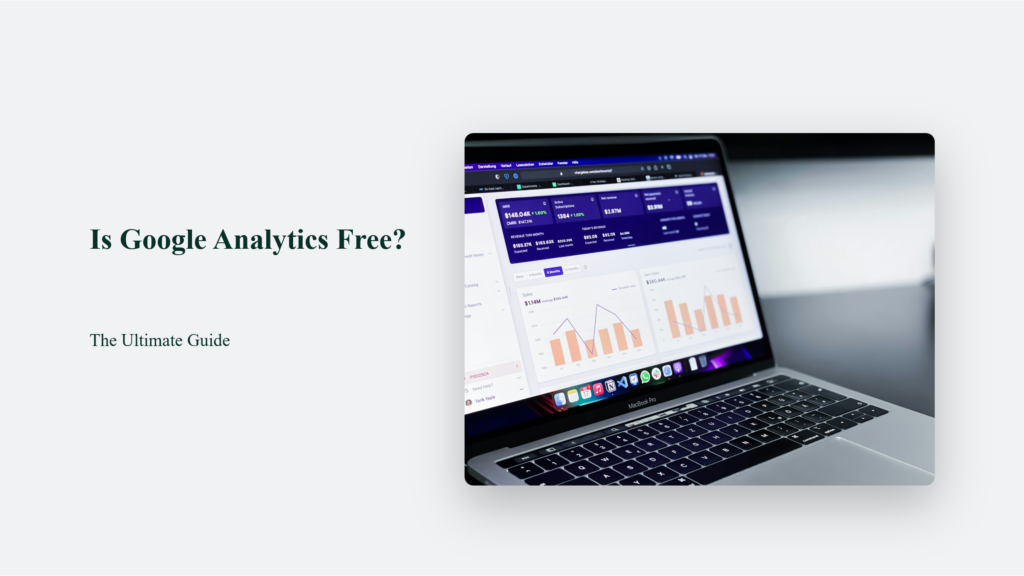

Is Google Analytics Free? The Ultimate Guide

As Seen On
In today’s data-driven world, understanding your website’s performance is crucial for making informed decisions and driving business growth. Google Analytics, a powerful web analytics platform, has become an indispensable tool for website owners, marketers, and businesses of all sizes.
But the question on many minds is, “Is Google Analytics free?” The short answer is yes, but there’s much more to this robust platform than meets the eye.
As someone who has worked in the digital marketing industry for over a decade, I’ve witnessed firsthand the transformative impact of Google Analytics on businesses. This tool has become essential to any successful online strategy, from tracking website traffic and user behaviour to analysing conversion rates and optimising marketing campaigns.

The Power of Google Analytics: A Game-Changer for Businesses
Google Analytics is a game-changer for businesses, providing invaluable insights into their online presence. With its comprehensive suite of features, it empowers you to:
Understand Your Audience:
One of Google Analytics’s most powerful aspects is its ability to provide deep insights into your website visitors, including their demographics, interests, and behaviour patterns. Understanding who your visitors are and how they interact with your site allows you to tailor your content, marketing strategies, and user experience to meet their needs and preferences better.
For example, the Audience Reports in Google Analytics can reveal valuable information about your users’ age, gender, location, interests, and device preferences. This data can inform decisions such as optimising your website for mobile devices if a majority of your visitors are accessing it from smartphones or tablets or tailoring your content and offerings to specific regions where your audience is concentrated.
Track Performance Metrics
Google Analytics enables businesses to monitor key performance indicators (KPIs) such as pageviews, bounce rates, and conversion rates, facilitating data-driven decision-making. These metrics provide insights into how users engage with your website, which pages are performing well, and where potential issues or opportunities for improvement may lie.
For instance, the Behavior Reports in Google Analytics can help you identify pages with high bounce rates, indicating that visitors quickly leave those pages. This information can prompt you to evaluate page speed, content relevance, call-to-actions, and mobile-friendliness, leading to optimisations that improve user engagement and retention.
Optimise User Experience
By analysing user flow, engagement, and drop-off points, Google Analytics empowers businesses to identify areas for improvement and ensure a seamless and engaging experience for their visitors.
The Behavior Flow report, for example, can reveal common paths users take through your website, allowing you to optimise those paths and drive visitors toward the most important pages or conversion points.
Additionally, features like Session Quality and Conversion Probability, powered by Analytics Intelligence’s machine learning capabilities, can provide valuable insights into user engagement and the likelihood of conversions, enabling you to make data-driven decisions to enhance the overall user experience.
Measure Marketing Campaigns
Google Analytics is an invaluable tool for evaluating the effectiveness of your marketing efforts, including paid advertising, social media, and email campaigns.
The Acquisition Reports provide a breakdown of traffic sources, allowing you to quantify the reach and impact of specific campaigns or channels. For instance, if you run a Google Ads campaign, you can track the traffic and conversions generated from that campaign within the Acquisition Reports.
By analysing the performance of different marketing channels, you can make informed decisions about allocating resources more efficiently and optimising your overall marketing strategy.
By leveraging these powerful features, Google Analytics empowers businesses to understand their online presence comprehensively, make data-driven decisions and drive growth and profitability in the ever-evolving digital landscape.
Is Google Analytics Free?
While Google Analytics offers robust features, it’s essential to understand the different versions available and their respective pricing models. Here’s a breakdown:
The Free Version: Google Analytics Standard
The short answer is yes; Google Analytics does offer a free version known as Google Analytics Standard. This version provides a comprehensive suite of features that cater to the needs of most small to medium-sized businesses and website owners. Some of the key features included in the free version are:
- Real-time reporting
- Custom dashboards and reports
- Integration with other Google products (Google Ads, Google Search Console, etc.)
- Audience insights (demographics, interests, behaviour)
- Acquisition and behaviour analysis
- Conversion tracking and goal setting
With the free version of Google Analytics, you can gain valuable insights into your website’s performance, user behaviour, and marketing campaign effectiveness. It empowers you to make data-driven decisions and optimise your online presence without incurring any upfront costs.
The Premium Version: Google Analytics 360
While the free version of Google Analytics is powerful, Google also offers a premium, enterprise-level solution called Google Analytics 360. This paid version is designed for larger organisations with more complex data and reporting needs. Some of the key features and benefits of Google Analytics 360 include:
- Unsampled data for accurate reporting
- Data-driven attribution modeling
- Advanced integration capabilities
- Dedicated support and training
- Increased data processing capacity
- Custom dimensions and metrics
Google Analytics 360 is a subscription-based service, and the pricing is based on factors such as data volume, the number of users, and additional features required.
Optimising Your Website with Google Analytics

Google Analytics is not just a tool for tracking and reporting data; it’s also a powerful platform for optimising your website’s performance. By analysing user behaviour and identifying areas for improvement, you can enhance the user experience and drive better results. Here are some ways you can optimise your website using Google Analytics:
- Improve Site Speed: Slow-loading pages can lead to high bounce rates and poor user engagement. Use Google Analytics to identify pages with long load times and optimise them for better performance.
- Enhance User Flow: Analyse user flow reports to understand how visitors navigate your site. Identify bottlenecks or confusing paths and adjust to improve the overall user experience.
- Optimise Content: Analyse pageviews, time on page, and bounce rates to identify your most popular and engaging content. Use these insights to create more content that resonates with your audience.
- Refine Marketing Campaigns: Track the performance of your marketing campaigns, including paid advertising, email marketing, and social media efforts. Use the data to refine your strategies and allocate resources more effectively.
- Conduct A/B Testing: Use Google Analytics to set up and analyse A/B tests. These tests allow you to experiment with different website elements (such as headlines, calls-to-action, or layouts) and determine which variations perform best.
By continuously optimising your website based on data-driven insights from Google Analytics, you can improve user engagement, increase conversions, and drive better overall business results.
Choosing the Right Version for Your Business
When deciding between the free and paid versions of Google Analytics, it’s essential to consider your business’s specific needs and requirements. Here are some factors to consider:
- Data Volume: If your website receives high traffic (typically over 10 million hits per month), the free version may start sampling your data, potentially leading to inaccuracies. The paid version’s unsampled data capabilities may be beneficial in such cases.
- Reporting Complexity: The premium version may be better if you require advanced reporting features, custom dimensions and metrics, or data-driven attribution modeling.
- Integration Needs: If you heavily rely on integrations with other marketing and advertising platforms, Google Analytics 360’s advanced integration capabilities could be advantageous.
- Support and Training: The dedicated support and training provided by Google Analytics 360 can be invaluable for larger organisations with complex analytics needs.
For most small to medium-sized businesses and website owners, the free version of Google Analytics is often sufficient to meet their analytics needs. However, upgrading to the paid version may be worthwhile as your business grows and your data requirements become more complex.
Conclusion
In our data-driven world, Google Analytics has emerged as a game-changer, empowering businesses of all sizes to make informed decisions and drive growth. While the free version of Google Analytics offers a comprehensive set of features suitable for most businesses, the premium version, Google Analytics 360, caters to the more complex needs of larger organisations.
Ultimately, choosing between the free and paid versions should be based on your business’s requirements, data volume, reporting complexity, and budget. Regardless of your version, embracing the power of data-driven insights and leveraging Google Analytics’ capabilities can be a game-changer for your online success.
Frequently Asked Questions:
Can I upgrade from the free version to the paid version later?
Yes, you can upgrade from the free version of Google Analytics to the paid version (Google Analytics 360) anytime. However, the process may involve migrating your data and settings, so planning the transition carefully is recommended.
Does the free version of Google Analytics offer real-time reporting?
Yes, the free version of Google Analytics includes real-time reporting capabilities, allowing you to monitor user activity on your website in real time.
Can I track mobile app performance with the free version of Google Analytics?
Yes, the free version of Google Analytics supports mobile app tracking, allowing you to analyze user engagement, conversions, and other key metrics for your mobile applications.
Konger
Up until working with Casey, we had only had poor to mediocre experiences outsourcing work to agencies. Casey & the team at CJ&CO are the exception to the rule.
Communication was beyond great, his understanding of our vision was phenomenal, and instead of needing babysitting like the other agencies we worked with, he was not only completely dependable but also gave us sound suggestions on how to get better results, at the risk of us not needing him for the initial job we requested (absolute gem).
This has truly been the first time we worked with someone outside of our business that quickly grasped our vision, and that I could completely forget about and would still deliver above expectations.
I honestly can't wait to work in many more projects together!
Disclaimer
*The information this blog provides is for general informational purposes only and is not intended as financial or professional advice. The information may not reflect current developments and may be changed or updated without notice. Any opinions expressed on this blog are the author’s own and do not necessarily reflect the views of the author’s employer or any other organization. You should not act or rely on any information contained in this blog without first seeking the advice of a professional. No representation or warranty, express or implied, is made as to the accuracy or completeness of the information contained in this blog. The author and affiliated parties assume no liability for any errors or omissions.

